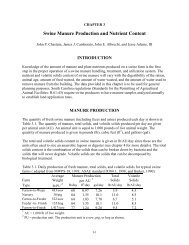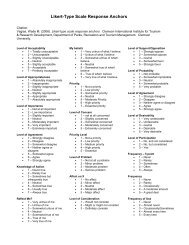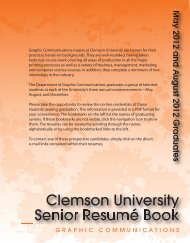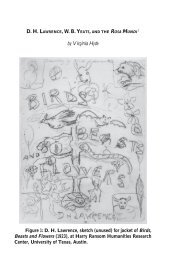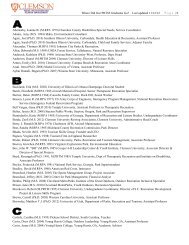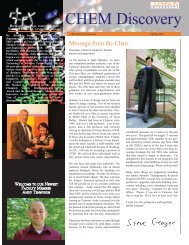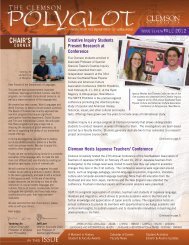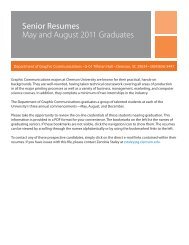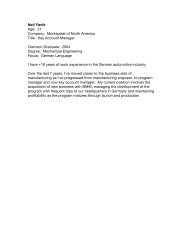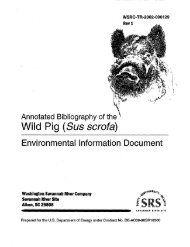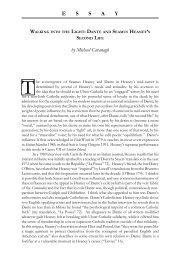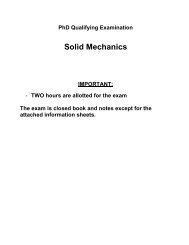Woolfian Boundaries - Clemson University
Woolfian Boundaries - Clemson University
Woolfian Boundaries - Clemson University
You also want an ePaper? Increase the reach of your titles
YUMPU automatically turns print PDFs into web optimized ePapers that Google loves.
178 WOOLFIAN BOUNDARIES<br />
makes this such an intense and cryptic novel to read. 4 But Woolf was also a writer with<br />
a strong vision to communicate; a writer who posed penetrating and stringent critiques<br />
of her society; a writer who probed as far as she could into the depths of reality, on the<br />
grounds, again to draw upon Th e Years, that we cannot model a new society if we do not<br />
know ourselves. But how do you communicate any system of values without it becoming<br />
propaganda? How do you assert a strong coherent vision without the attendant assumption<br />
that your vision encompasses all?<br />
In this light, I would argue, the ragged edge establishes a double textual ethics: on the<br />
part of the writer, an ethics of interpolation, in which the text is constructed as both provisional<br />
and contingent by being inserted into larger ongoing communal fl ow of thought;<br />
on the part of the reader, an ethics of extrapolation, in which the freedom of the future to<br />
break out into the new must do so in response to the words of the past. Th e ethics of interpolation<br />
enable the writer to communicate values without their becoming propaganda;<br />
the ethics of extrapolation unite the reader’s freedom to determine her own values with a<br />
responsibility to the text that has been read.<br />
Th e dynamics I think are easier to explain than to achieve. Ethical writing does not<br />
come about without a struggle, and it is this struggle that becomes graphically evident<br />
in the playwright Miss La Trobe. For if even La Trobe’s pluralistic participatory theatre<br />
comes under the threat of being domineering, is Woolf not suggesting that all writing is<br />
subject to a colonizing desire to impose its own views? Rather than targeting La Trobe<br />
for her assertive proclivities (allowing us to distance ourselves from these characteristics<br />
as belonging to the enemy), is Woolf not exposing the “subconscious Hitlerism” 5 that lies<br />
in all human nature, that is indeed inseparable from the artist’s ability to create? Th at is,<br />
is she not showing us something about ourselves? Th e amazing victory, then, is that La<br />
Trobe resists her desire for infl uence, takes down that fourth wall of the stage, empowers<br />
other human beings and even animals as creators, makes the choice, to her own cost, that<br />
to lose her audience is better than to win them by authoritative means. La Trobe succeeds<br />
in communicating values without writing propaganda through a conscious and heroic<br />
eff ort to give her words to her audience and to take nothing for herself. Furthermore, her<br />
play avoids the monist narrative guided by origin and teleology by drawing upon multiple<br />
source texts and beginnings, and by transposing into other voices at the end. Th e closest<br />
we get to an originary source is that fertile mud in her mind, but we must also note that<br />
the words bubbling out of it are organic transformations of words that have descended<br />
into it fi rst. La Trobe was indeed listening to those voices in the pub, and the implication<br />
is that those choric voices have sunk deep into her unconscious to mingle with all the<br />
cultural detritus that has accumulated in her memory. As Bart Oliver intuits, what La<br />
Trobe sought out, at the end of the day, was “darkness in the mud; a whisky and soda at<br />
the pub; and coarse words descending like maggots through the waters” (BA 203). Linked<br />
to the cesspool of the novel’s opening words, the fertilizing mud comes close to being<br />
a circulating alimentary-excremental paradigm for art’s generation, showing once again<br />
how those early critics who thought that Woolf eschewed the body were so wrong. 6 Does<br />
not Woolf indeed—to employ another organic metaphor—suggest a paradigm of art as<br />
cultural compost: a process of decomposition and composition occurring in the interval<br />
between the old and the new? For as part of a continuous process of derivation, assimilation,<br />
transformation, and generation, La Trobe’s words are interjected into the ongoing



